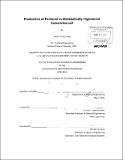Production of pentanol in metabolically engineered Escherichia coli
Author(s)
Tseng, Hsien-Chung, Ph. D. Massachusetts Institute of Technology
DownloadFull printable version (23.94Mb)
Other Contributors
Massachusetts Institute of Technology. Dept. of Chemical Engineering.
Advisor
Kristala L. Jones Prather.
Terms of use
Metadata
Show full item recordAbstract
Public concerns about global warming and energy security contribute to an ever-increasing focus on biologically-derived fuels, leading to significant interest in several candidate molecules capable of complementing petroleum-derived fuel resources. Ethanol, one of the most developed biofuels, is used extensively as a gasoline additive. However, the high water miscibility of ethanol creates corrosion problems when transporting the fuel by pipelines. Furthermore, the low energy density of ethanol limits its fuel efficiency. Thus, it is important to explore alternative biofuels with properties that are more similar to conventional gasoline. With a higher energy density, enhanced physical properties that would allow better integration with current infrastructure, pentanol represents an excellent alternative, and has the potential to be a replacement for gasoline. The primary objective of my thesis work is to construct pentanol biosynthetic pathways in Escherichia coli, offering the possibility of producing pentanol from renewable carbon sources through microbial fermentations. We used butanol synthesis as a platform from which microbial synthesis of pentanol can be obtained. To explore the possibility of employing the butanol pathway enzymes for pentanol biosynthesis, we implemented a bypass/feeding strategy to thoroughly evaluate the ability of those enzymes to act on five-carbon substrates. Additionally, by boosting the intracellular NADH availability, we achieved up to 85 mg/L pentanol from glucose and propionate, providing an initial proof-of-concept of a functional and feasible pentanol biosynthetic pathway in E. coli. Furthermore, a platform pathway was established for synthesis of value-added chiral 3-hydroxyalkanoic acids with applications ranging from chiral building blocks to high-value pharmaceuticals. Of significance, such pathway was constructed as one portion of the pentanol pathway, illustrating versatility of our pentanol pathway as it can be modularized for synthesis of various valuable chemicals. Altogether, our results suggest that direct microbial synthesis of pentanol solely from glucose or glycerol can be realized once an efficient redox balancing within the recombinant strains is ensured. As construction of desired biosynthetic pathways is just the first step toward economically viable pentanol production, increasing the titer, yield, and productivity will ultimately determine the feasibility of such pathways.
Description
Thesis (Ph. D.)--Massachusetts Institute of Technology, Dept. of Chemical Engineering, 2011. Cataloged from PDF version of thesis. Includes bibliographical references (p. 149-160).
Date issued
2011Department
Massachusetts Institute of Technology. Department of Chemical EngineeringPublisher
Massachusetts Institute of Technology
Keywords
Chemical Engineering.